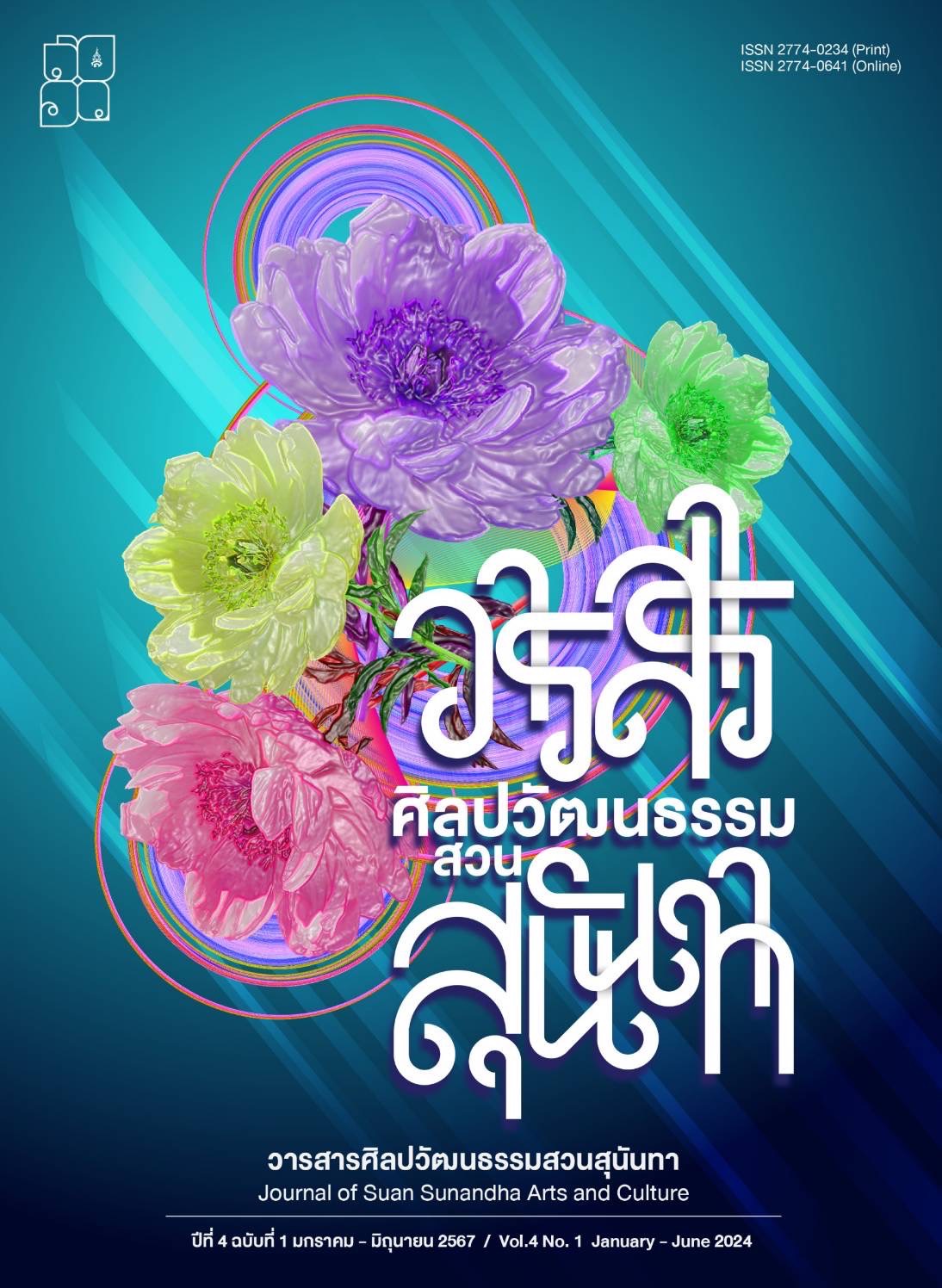A CONSTRUCTION OF DESIRABLE CHARACTERISTICS CULTURE RELATED TO QUALIFICATION FRAMEWORK OF BACHELOR DEGREE FOR MATHEMATICS MAJOR, FACULTY OF EDUCATION, SUAN SUNANDHA RAJABHAT UNIVERSITY
Keywords:
Desirable Characteristics, Problem-based-learning, Research-based-learning, Active Learning, CultureAbstract
This academic paper is a synthesis of the results of research on the creation of desirable graduate characteristics culture in accordance with the framework of qualification standards. Undergraduate degrees emphasize three attributes: 1) being a learner, intelligent and intelligent, 2) being an innovator, and 3) being a talent in learning management. Problem-Based Learning for Math students in the 3rd year, Aspect 2) Active Learning for Mathematics students in the 1st year and Aspect 3) Research-Based Learning for Mathematics students in the 5th year with a research period of one semester. The results of the research showed that 1. problem-based learning management can create the characteristics of 3rd year students to have the characteristics of being learners, intelligent and intelligent at a good level, 2. active learning management can create 1st year students with significant attributes of being co-innovators at the level of .05 and 3. research-based learning management can create 5th year students to develop the characteristics of being able to manage learning at a good level.
References
กรมวิชาการ กระทรวงศึกษาธิการ. หลักสูตรแกนกลางการศึกษาขั้นพื้นฐาน พุทธศักราช 2551. กรุงเทพฯ: องค์การรับส่งสินค้าและพัสดุภัณฑ์, 2552.
ณัฐพร เอี่ยมทอง. “การเปรียบเทียบผลสัมฤทธิ์ทางการเรียนคณิตศาสตร์และความสามารถในการคิดวิเคราะห์ของนักศึกษาระดับชั้นมัธยมศึกษาปีที่ 5 ที่เรียนโดยรูปแบบ Problem-based Learning กับรูปแบบการสอนปกติ.” วิทยานิพนธ์การศึกษามหาบัณฑิต สาขาวิชาหลักสูตรและการสอน มหาวิทยาลัยบูรพา, 2560.
นภดล กมลวิลาศเสถียร. เทคนิคช่วยให้ลูกเก่งคณิตศาสตร์. กรุงเทพฯ: พิมพ์ดี จำกัด, 2550.
ปิยรัตน์ จาตุรันตบุตร. หลักการคณิตศาสตร์ = Principles of mathematics. กรุงเทพฯ:สำนักพิมพ์แห่งจุฬาลงกรณ์มหาวิทยาลัย, 2547.
พิจิตร อุตตะโปน. “ชุดการเรียนการสอนโดยใชปญหาเปนฐาน เรื่อง การคิดวิเคราะห์ข้อมูลเบื้องต้นระดับชั้นมัธยมศึกษาปีที่ 3.” ปริญญานิพนธ, การศึกษามหาบัณฑิต สาขาวิชาคณิตศาสตร์ มหาวิทยาลัยศรีนครินทรวิโรฒ, 2550.
วรพงศ์ ไชยฤกษ์. “ผลสัมฤทธิ์ทางการเรียนวิชาภาษาไทยร่วมสมัยและการรู้สารสนเทศของนักศึกษาที่ได้รับการสอนโดยการใช้เทคนิคการสอนแบบการเรียนรู้เชิงรุก.” วารสารนวัตกรรมการเรียนรู้, 1 (1) (ม.ค.-มิ.ย.), 2558, (77-95).
สำนักงานคณะกรรมการอุดมศึกษา. มาตรฐานคุณวุฒิระดับปริญญาตรี สาขาครุศาสตร์และ
สาขาศึกษาศาสตร์ (หลักสูตรสี่ปี) พ.ศ. 2562. กรุงเทพ: สำนักงานคณะกรรมการอุดมศึกษา, 2562.
สำนักงานเลขาธิการคุรุสภา. รายละเอียดของมาตรฐานความรู้และประสบการณ์วิชาชีพครูตามข้อบังคับคุรุสภาว่าด้วยมาตรฐานวิชาชีพ (ฉบับที่ 4) พ.ศ. 2562. กรุงเทพฯ: สำนักงานเลขาธิการคุรุสภา, 2562.
Healey, M. Linking research and teaching: Exploring disciplinary spaces and the role of inquiry-based learning. In Reshaping the University: New relationships between research, scholarship and teaching. R. Barrett (Ed.), pp. 67-78. Columbus, OH: McGraw Hill, 2005.
Downloads
Published
How to Cite
Issue
Section
License

This work is licensed under a Creative Commons Attribution-NonCommercial-NoDerivatives 4.0 International License.
วารสารศิลปวัฒนธรรมสวนสุนันทา เป็นวารสารในรูปแบบเปิด (Open Access) ผู้ใช้ทั่วไปหรือระบบสารสนเทศของหน่วยงาน ฐานข้อมูลอัตโนมัติ ระบบห้องสมุดอัตโนมัติ สามารถเข้าถึง ดาวน์โหลด เอกสารไฟล์บทความบนเว็บไซต์วารสาร โดยไม่มีค่าใช้จ่ายแต่อย่างใด
ข้อความภายในบทความที่ตีพิมพ์ในวารสารศิลปวัฒนธรรมสวนสุนันทาทั้งหมด รวมถึงรูปภาพประกอบ ตาราง เป็นลิขสิทธิ์ของสำนักศิลปะและวัฒนธรรม มหาวิทยาลัยราชภัฏสวนสุนันทา การนำเนื้อหา ข้อความหรือข้อคิดเห็น รูปภาพ ตาราง ของบทความไปจัดพิมพ์เผยแพร่ในรูปแบบต่าง ๆ เพื่อใช้ประโยชน์ในเชิงพาณิชย์ ต้องได้รับอนุญาตจากกองบรรณาธิการวารสารอย่างเป็นลายลักษณ์อักษรอนุญาตให้สามารถนำไฟล์บทความไปใช้ประโยชน์และเผยแพร่ต่อได้ โดยอยู่ภายใต้เงื่อนไข สัญญาอนุญาตครีเอทีฟคอมมอน (Creative Commons License: CC) และ ต้องแสดงที่มาจากวารสาร – ไม่ใช้เพื่อการค้า – ห้ามแก้ไขดัดแปลง, Attribution-NonCommercial-NoDerivatives 4.0 International (CC BY-NC-ND 4.0)
ข้อความที่ปรากฏในบทความในวารสารเป็นความคิดเห็นส่วนตัวของผู้เขียนแต่ละท่านไม่เกี่ยวข้องกับสำนักศิลปะและวัฒนธรรม มหาวิทยาลัยราชภัฏสวนสุนันทา และบุคลากร คณาจารย์ท่านอื่น ๆ ในราชวิทยาลัยฯแต่อย่างใด ความรับผิดชอบองค์ประกอบทั้งหมดของบทความแต่ละเรื่องเป็นของผู้เขียนแต่ละท่าน หากมีความผิดพลาดใด ๆ ผู้เขียนแต่ละท่านจะรับผิดชอบบทความของตนเอง ตลอดจนความรับผิดชอบด้านเนื้อหาและการตรวจร่างบทความเป็นของผู้เขียน ไม่เกี่ยวข้องกับกองบรรณาธิการ



